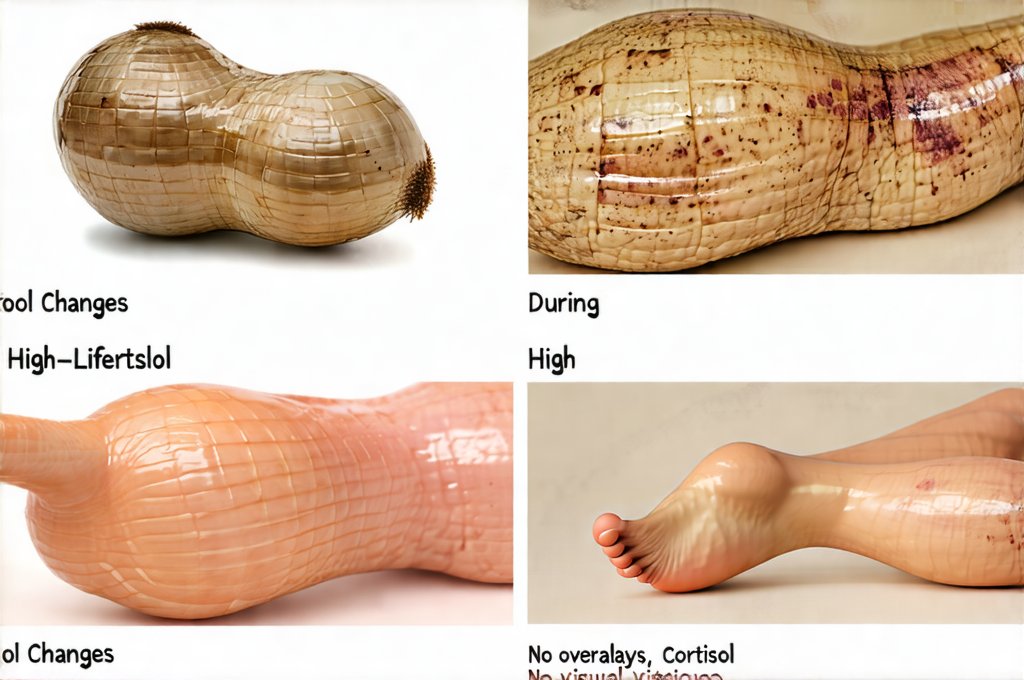The human digestive system is an incredibly sensitive ecosystem, responding rapidly to changes in both physical and emotional states. While we often associate stool changes with dietary indiscretions or infections, they can also be a significant indicator of underlying stress, particularly when cortisol levels are chronically elevated. Cortisol, often dubbed the “stress hormone,” plays a crucial role in our body’s response to perceived threats, triggering a cascade of physiological events designed to mobilize energy and enhance alertness. However, prolonged activation of this system – what we commonly experience as a high-cortisol lifestyle phase – disrupts numerous bodily functions, including digestion, leading to a diverse range of stool alterations that can be confusing and concerning for those experiencing them. Understanding the connection between cortisol and bowel habits is not about self-diagnosis; it’s about recognizing potential signals from your body and exploring appropriate support strategies.
The interplay between stress, hormones, and gut health is complex and bidirectional. The gut itself possesses a nervous system – often referred to as the “second brain” – capable of independent function but also intimately connected to the central nervous system via the vagus nerve. This gut-brain axis allows for constant communication, meaning that emotional distress can directly impact digestive processes and vice versa. Chronic stress doesn’t just affect how we digest food; it changes the composition of our gut microbiome, potentially reducing beneficial bacteria and fostering an environment conducive to inflammation, which further exacerbates digestive issues and stool irregularities. Recognizing these patterns is a crucial first step toward addressing the root causes rather than simply treating symptoms. You can learn more about evaluating gut response to better understand your body’s signals.
The Cortisol-Digestion Connection: A Deep Dive
Cortisol directly impacts digestion in several ways. During acute stress (the “fight or flight” response), blood flow is diverted away from non-essential systems like digestion and towards muscles, heart, and lungs to prepare for immediate action. This means slower gastric emptying – food sits longer in the stomach – reduced intestinal motility (slower movement of food through the intestines), and decreased secretion of digestive enzymes and hydrochloric acid. While this is normal during a short-term stressful event, it becomes problematic when prolonged. Chronic cortisol elevation essentially puts the brakes on efficient digestion.
This disruption can manifest as a wide spectrum of stool changes. Constipation is common because slower intestinal motility leads to harder stools that are difficult to pass. Conversely, diarrhea can occur due to accelerated gut transit time in some individuals—a paradoxical effect where anxiety or stress “speeds up” the digestive system. Other frequent complaints include bloating, gas, abdominal pain and a general feeling of discomfort after eating. It’s important to note that these symptoms are often intermittent and not consistently present, making them harder to pinpoint as directly related to stress without careful observation and self-awareness. If you notice significant changes, consider reviewing stool signs that shouldn’t be ignored.
Furthermore, cortisol impacts the gut microbiome. Stress reduces the diversity of beneficial bacteria in the gut, creating an imbalance called dysbiosis. This disruption can impair nutrient absorption, weaken the intestinal barrier (leading to “leaky gut”), and contribute to chronic inflammation, all contributing to further digestive upset. The relationship isn’t one-directional; a healthy microbiome actually helps regulate cortisol levels, offering a feedback loop where stress impacts the gut, and an unhealthy gut amplifies stress responses. This is why addressing both aspects – managing stress and supporting gut health – is essential for long-term well-being. Understanding stool color and texture can also provide valuable insights.
Identifying High-Cortisol Lifestyle Phases
Recognizing when you’re in a prolonged period of high cortisol isn’t always straightforward. It requires honest self-assessment and attention to subtle cues beyond just stool changes. Common indicators include:
- Persistent Fatigue: Despite adequate sleep, feeling consistently tired and drained.
- Difficulty Sleeping: Struggling to fall asleep or stay asleep, often with racing thoughts.
- Increased Anxiety & Irritability: Feeling on edge, easily frustrated, or experiencing heightened worry.
- Weight Gain (especially around the abdomen): Cortisol promotes fat storage, particularly in the abdominal region.
- Frequent Illness: A weakened immune system due to chronic stress makes you more susceptible to infections.
Beyond these general symptoms, consider your lifestyle. Are you consistently under pressure at work? Are you dealing with significant life changes or ongoing stressful events (relationship issues, financial strain, caregiving responsibilities)? Do you struggle to set boundaries and say “no”? These are all factors that contribute to prolonged cortisol elevation. Keeping a journal can be immensely helpful in tracking these patterns and identifying triggers. Sometimes lifestyle changes are necessary for reducing reactions.
The Role of the Vagus Nerve & Gut-Brain Axis
The vagus nerve acts as a direct communication line between your gut and brain, influencing digestion, mood, and overall well-being. High cortisol levels impair vagal tone – essentially reducing the efficiency of this neural pathway. This diminished connection can exacerbate digestive issues and contribute to emotional dysregulation. Conversely, practices that enhance vagal tone can help buffer stress responses and improve digestive function.
Techniques like deep diaphragmatic breathing, meditation, yoga, cold exposure (within safe limits), and even singing or humming stimulate the vagus nerve. These activities encourage a shift from the sympathetic nervous system (“fight or flight”) to the parasympathetic nervous system (“rest and digest”), promoting relaxation and improved gut function. Prioritizing these practices isn’t about eliminating stress entirely—that’s unrealistic—but about building resilience and capacity to manage it effectively. Lifestyle changes can have a significant impact on overall well being.
Dietary Considerations During Stressful Periods
While dietary changes shouldn’t be seen as a cure for high cortisol, they can play a supportive role in mitigating digestive symptoms and promoting gut health. During times of stress:
- Focus on Easily Digestible Foods: Avoid overly processed foods, excessive fiber (which can exacerbate diarrhea), and large, heavy meals. Opt for cooked vegetables, lean proteins, and healthy fats.
- Prioritize Gut-Healing Nutrients: Incorporate foods rich in probiotics (fermented foods like yogurt, kefir, sauerkraut) and prebiotics (foods that feed beneficial bacteria, such as bananas, onions, garlic).
- Limit Inflammatory Foods: Reduce intake of sugar, processed foods, caffeine, and alcohol, which can all contribute to inflammation and further disrupt gut health.
- Stay Hydrated: Adequate water intake is crucial for optimal digestion and stool consistency.
It’s important to remember that dietary needs are highly individual. What works for one person may not work for another. Experimenting with different foods and paying attention to how your body responds is key. Consider working with a registered dietitian or nutritionist who can provide personalized guidance based on your specific circumstances. You might also find it helpful to explore foods to choose during stressful periods, even if not directly related to menstruation.
Ultimately, stool changes during high-cortisol lifestyle phases aren’t simply unpleasant symptoms; they’re valuable signals from your body urging you to address underlying stress and prioritize holistic well-being. By understanding the intricate connection between cortisol, digestion, the gut microbiome, and the vagus nerve, you can take proactive steps towards restoring balance and reclaiming digestive health.


















